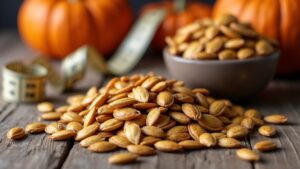Pumpkin seeds could/may/can seem like a simple snack, but they pack a surprising punch for weight loss. Loaded with fiber, protein, and healthy fats, they help curb hunger and keep energy levels steady. Their magnesium content supports metabolism, while antioxidants reduce inflammation—both key for shedding pounds. Beyond that, their heart-healthy fats and blood sugar-balancing effects make them a smart choice for anyone watching their weight. The real question is, how can something so small be so powerful?
May Support Healthy Weight Loss With Nutrient Density
Pumpkin seeds pack a nutrient-dense punch that could assist with weight loss when consumed in moderation. These small but mighty seeds from pumpkins deliver fiber, protein, and unsaturated fatty acids—nutrients linked to reduced hunger and better weight management.
The fiber in pumpkin seeds slows digestion, boosting feelings of fullness and helping curb unnecessary snacking. Protein also plays a role in satiety, while unsaturated fats support metabolic health. Despite their nutrient density, the calorie content of pumpkin seeds is relatively high, so portion control matters.
Studies suggest that meeting daily fiber needs (19–38 grams for adults) would aid weight loss, and just half a cup of pumpkin seeds provides 5 grams. Eating them mindfully can help balance their benefits without overdoing calories.
Heart Health Benefits Linked to Weight Management
Pumpkin seeds could support heart health in ways that can also help with weight management. Their nutrients can lower blood pressure, boost good cholesterol, and reduce the risk of heart disease.
This creates a positive cycle, as a healthier heart often makes it easier to maintain an active lifestyle.
Lowers Blood Pressure
Because heart health and weight management often go hand in hand, the nutrients in pumpkin seeds can play a key role in lowering blood pressure. Their high magnesium content helps relax blood vessels, promoting healthy circulation and reducing strain on the heart.
Pumpkin seeds also contain unsaturated fats and antioxidants, which can help reduce blood pressure by improving blood flow. For those managing weight, these seeds provide fiber and protein that support satiety, indirectly aiding heart health. Studies suggest pumpkin seed oil can lower diastolic blood pressure, benefiting those with hypertension.
Boosts Good Cholesterol
Including these small but mighty seeds in your diet can assist raise HDL cholesterol, the kind that supports heart health. Pumpkin seeds contain unsaturated fats, like alpha-linolenic acid (ALA), which studies suggest can improve good cholesterol levels.
Research shows pumpkin seed oil could be particularly beneficial for postmenopausal women, helping balance HDL. The magnesium in these seeds also plays a role, supporting healthy blood pressure and lowering cardiovascular disease risk. Additionally, antioxidants like vitamin E in pumpkin seeds combat inflammation, further protecting heart health.
Reduces Heart Disease Risk
Beyond improving cholesterol levels, the heart-protective qualities of pumpkin seeds extend to lowering the risk of cardiovascular disease. Rich in unsaturated fats like ALA, they help balance lipid markers, including boosting HDL, the “good” cholesterol.
The magnesium in pumpkin seeds supports healthy blood pressure, while antioxidants combat oxidative stress and inflammation—key contributors to heart disease. Their fiber content also aids digestion and blood sugar control, further protecting heart health.
Studies, including one on postmenopausal women, show pumpkin seed oil improves cholesterol profiles. By addressing multiple risk factors—high cholesterol, inflammation, and blood pressure—pumpkin seeds offer a simple, nutrient-packed way to support a healthier heart. Including them in meals can be a small change with big benefits.
High Fiber Content Promotes Satiety and Digestion
Pumpkin seeds contain a significant amount of fiber, which helps keep hunger at bay by making meals feel more satisfying.
This fiber also supports digestion by promoting gut health and stabilizing blood sugar levels. Including them in a balanced diet could help reduce unnecessary snacking and support weight management efforts.
Boosts Fullness Levels
Many foods can help curb hunger, but pumpkin seeds stand out because of their high fiber content. Their nutrient content supports weight management by keeping hunger at bay and improving dietary adherence.
Promotes Fullness: The fiber in pumpkin seeds slows digestion, helping regulate blood sugar and reducing sudden hunger pangs.
Aids Weight Loss: Studies show higher fiber intake supports weight loss by making it easier to stick to a balanced diet.
Supports Digestion: Fiber encourages healthy gut bacteria and regular bowel movements, preventing bloating and discomfort.
Balances Nutrients: With 5 grams of fiber per half-cup, pumpkin seeds help meet daily needs without excess calories.
Including them in meals can make weight loss feel less like a struggle and more sustainable.
Supports Gut Health
A half-cup serving of pumpkin seeds packs 5 grams of fiber, making them a powerful ally for gut health. The soluble fiber in these seeds forms a gel-like substance in the digestive tract, slowing digestion and promoting feelings of fullness.
Meanwhile, the insoluble fiber adds bulk to stool, supporting regular bowel movements and preventing discomfort. This dual action keeps the digestive system running smoothly while stabilizing blood sugar levels, which can aid in weight management. The fiber content also encourages slower eating, giving the brain time to register fullness.
Protein-Packed Snack for Muscle Retention
These tiny powerhouses pack 7 grams of protein in just one ounce, making them a smart choice for anyone aiming to keep muscle while shedding pounds. Pumpkin seeds support weight management by providing essential nutrients that help maintain lean muscle and curb cravings.
- Muscle Retention: The high protein content helps preserve muscle mass during weight loss, ensuring the body burns fat instead.
- Appetite Control: Protein and fiber promote fullness, reducing unnecessary snacking and aiding in calorie control.
- Metabolism Boost: Arginine, an amino acid in pumpkin seeds, can enhance fat burning and improve metabolic efficiency.
- Recovery Support: Magnesium aids muscle function and recovery, keeping the body active and energized.
Including pumpkin seeds in a balanced diet can be a simple yet effective way to support weight loss without sacrificing muscle.
Antioxidants That May Boost Metabolism
Loaded with potent antioxidants, pumpkin seeds can play a role in revving up metabolism, making them a weight-loss ally beyond just protein. These antioxidants, like vitamin E and carotenoids, help reduce inflammation, which is linked to slowed metabolism and weight gain.
By lowering inflammation, the body can more efficiently burn fat and increase energy expenditure. The carotenoid beta-carotene supports thyroid function, a key regulator of metabolism, while magnesium aids enzyme function and energy production—both critical for maintaining a healthy metabolic rate.
Studies suggest these nutrients work together to boost metabolism naturally, helping the body convert food into energy more effectively. Including pumpkin seeds in a balanced diet can enhance metabolic efficiency, a key factor in sustainable weight loss.
Blood Sugar Regulation for Weight Control
Beyond supporting metabolism, pumpkin seeds also play a role in keeping blood sugar levels steady—a key factor in managing weight. Their low glycemic index and rich nutrient profile make them a smart choice for those aiming to control cravings and avoid spikes in glucose.
- Stabilizes Blood Sugar: The fiber and protein in pumpkin seeds slow digestion, preventing sudden rises in blood sugar.
- Supports Weight Management: Healthy fats and magnesium help improve insulin sensitivity, reducing the risk of diabetes-related weight gain.
- Promotes Satiety: The combination of fiber, protein, and healthy fats keeps hunger at bay, aiding portion control.
- Low Glycemic Impact: Unlike refined snacks, pumpkin seeds won’t cause energy crashes, making them ideal for sustained energy.
Including them in meals can be a simple step toward better blood sugar balance and weight control.
Conclusion
Research shows pumpkin seeds aid weight loss through hunger control and metabolism support. For instance, a 2021 study found participants who ate 30g daily felt fuller and lost more belly fat than the control group. While not a magic solution, their nutritional punch makes them a smart addition to balanced diets aiming for gradual, sustainable weight management.





